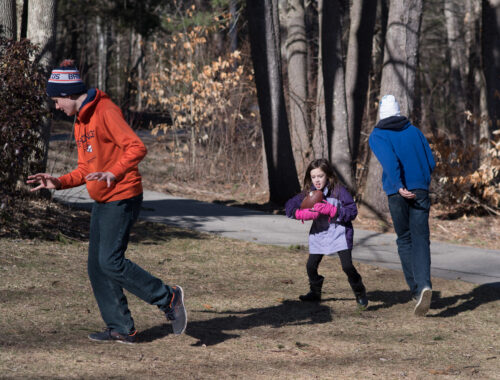
What Makes Us Whole?
“The central issue in this book is the conflict between the things we feel—the things our bodies register—and the things we think we ought to feel so as to comply with moral norms and standards we have internalized at a very early age.” —Alice Miller, The Body Never Lies
I have long thought that Mom’s development of pancreatic cancer had everything to do with the ways in which she was betrayed by one sister and two brothers. I never delved deeply into specifics of what she may have felt (how this betrayal actually played out in her mind, body, and soul), and I regret that there were barriers that prevented me from trying harder to reach her, but thinking of it in terms of what I just noted by Miller, I now wonder if, at some level, Mom was trying to reconcile how she was supposed to feel about her siblings with how she actually felt about them. That Italian volatility could be a good thing: when Mom and any one of her three brothers or three sisters got angry/annoyed/fed up, a shouting match would be the first step in clearing the air and moving them towards reconciliation. It was when they chose to keep these negative feelings to themselves that things got bad. A brother would stop talking to Mom for years at time; a sister would sneak around, planting seeds of discontent in the minds of her “allies”; two or three would band together to ensure that Mom knew she was not welcome in their “club.” It took a toll. I remember the anger and disappointment Mom would express to me in the year after her older, never married brother died without a will and one sister started legal proceedings to get the family home he had lived in until his death. Mom’s cancer surfaced about two years after she went to check on him and found him sitting on the front porch in a stupor, a few hours from death. Mom lived only five months after her diagnosis.
In my own life, I have been struggling with a different sort of conflict.
At the end of Return of the King, Sam arrives home after traveling to the ship that will take Frodo to the Grey Havens, his adorable little daughter runs out to meet him, and we hear Frodo’s voice: “My dear Sam. You cannot always be torn in two.”
Frodo’s words have been playing, over and over, in my head. I found myself rent between what I know and feel about the Church—heavily informed by the research I’ve done over the past two years and even before that, with the incompatibility among the papal bull Unam Sanctam, the doctrine of papal infallibility, and statements on salvation promulgated at Vatican II creating the first small hole in the wall, which has done nothing but widen and grow—and other people’s expectations and desires about the way I live my faith. Yes, it’s my faith, but I understand that culture gets threatened by chaos when a member of the tribe finds something amiss and tries to rectify it or make peace with it by acting in ways contrary to the status quo.
I understand that I could keep all of this to myself. Who really has to know, right? Well, that self-censoring to avoid conflict is not always the answer. Trust me on this; I spent most of my life wishing it were and trying to make it so, but it didn’t work. The only way I came close to finding peace of heart was by turning my back on people and walking away: avoidance, one way or another.
Not anymore.





2 Comments
Daja
My therapist believes that the reason I got sick two years ago and almost died is that my body was purging years of trauma in a violent way, because it all came into me in a violent way. It literally almost killed me. The doctors said it was a parasite and then IBS and then Crohn’s. And all that might be true. But it is also years of trauma, that I am finally letting go of. I don’t have to store it anymore.
Cheryl Ruffing
I remember when you got sick. I remember praying for you and trying to figure out what was wrong. Of course, I thought I probably had the answer, but I was finally starting to learn that most of us don’t want to hear the answer. I would have been wrong in “diagnosing” you, and I am thankful that, at some level at least, I had learned to respect other people and their problems enough to give them space. I agree with your therapist, who sounds like the right person for you. The threads get so tangled, but starting with one knot and working at it little by little is the only way to to make an unraveling even close to possible. I think I’ve managed to straighten a thread or two, but I’m sure I’ll always be working at the problem. Here’s to good eyesight and nimble fingers!